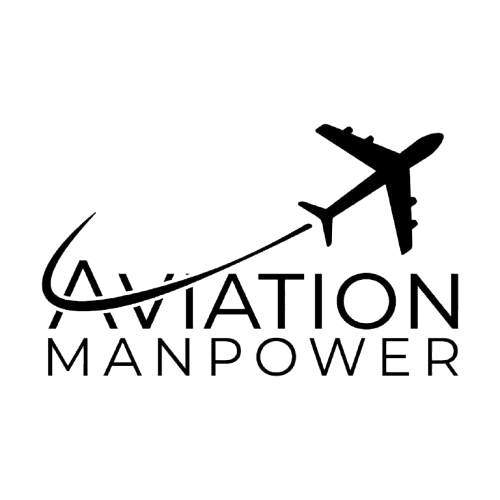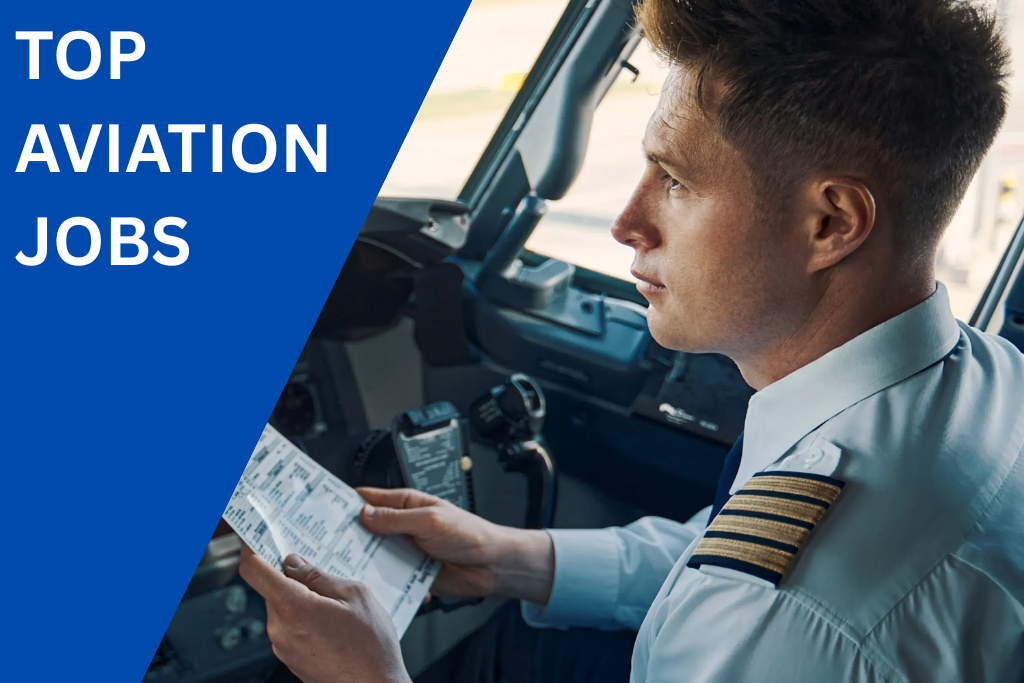Introduction
The aviation industry is one of the most dynamic and exciting fields to work in. From the thrill of flying to the intricate logistics of keeping airports running smoothly, there’s a role for almost every skill set and interest.
Whether you’re drawn to the cockpit, the control tower, or the engineering hangar, the aviation sector offers a wide range of career opportunities.
But with so many options, how do you know which path is right for you? And more importantly, how do you qualify for these roles?
In this blog, we’ll explore the top 10 in-demand aviation jobs, what they entail, and the steps you need to take to land them. Whether you’re a recent graduate, a career changer, or an aviation enthusiast, this guide will help you navigate your way to a rewarding career in the skies.
1. Commercial Pilot
What They Do:
Commercial pilots fly aircraft for airlines, cargo companies, and private charters. They are responsible for the safety of passengers, crew, and cargo, as well as navigating flights and communicating with air traffic control.
How to Qualify:
- Obtain a Private Pilot License (PPL) and Commercial Pilot License (CPL).
- Accumulate flight hours (typically 250+).
- Earn an Instrument Rating (IR) and Multi-Engine Rating (MER).
- Pass a Class 1 Medical Exam.
- Consider advanced certifications like the Airline Transport Pilot License (ATPL) for major airlines.
Why It’s In-Demand:
The global pilot shortage is creating a high demand for qualified commercial pilots, with airlines offering competitive salaries and benefits to attract talent.
2. Air Traffic Controller
What They Do:
Air traffic controllers manage the safe movement of aircraft in the sky and on the ground. They provide instructions to pilots, monitor flight paths, and ensure safe distances between planes.
How to Qualify:
- Complete an FAA-approved air traffic control program or have relevant work experience.
- Pass the Air Traffic Standardized Aptitude Test (AT-SAT).
- Complete training at the FAA Academy.
- Gain on-the-job experience at a control tower or center.
Why It’s In-Demand:
With increasing air traffic, the need for skilled air traffic controllers is growing. This role offers job stability and a high level of responsibility.
3. Aircraft Maintenance Engineer (AME)
What They Do:
Aircraft maintenance engineers inspect, repair, and maintain aircraft to ensure they are safe and operational. They work on engines, avionics, and other critical systems.
How to Qualify:
- Complete an FAA or EASA-approved aviation maintenance program.
- Obtain an Airframe and Powerplant (A&P) license.
- Gain hands-on experience through apprenticeships or entry-level roles.
- Stay updated with ongoing training and certifications.
Why It’s In-Demand:
As the aviation industry grows, so does the need for skilled technicians to maintain and repair aircraft. This role is critical for ensuring safety and compliance.
4. Flight Attendant
What They Do:
Flight attendants ensure the safety and comfort of passengers during flights. They provide customer service, demonstrate safety procedures, and handle emergencies.
How to Qualify:
- Complete a high school diploma or equivalent.
- Attend a flight attendant training program (often provided by airlines).
- Gain customer service experience.
- Pass airline-specific interviews and assessments.
Why It’s In-Demand:
With the rise in air travel, airlines are hiring more flight attendants to meet passenger needs. This role offers travel opportunities and flexible schedules.
5. Aviation Manager
What They Do:
Aviation managers oversee operations at airports, airlines, or aviation companies. They manage staff, budgets, and logistics to ensure efficient and safe operations.
How to Qualify:
- Earn a bachelor’s degree in aviation management, business, or a related field.
- Gain experience in aviation operations or management roles.
- Develop strong leadership and organizational skills.
- Consider certifications like the Certified Member (CM) designation from AAAE.
Why It’s In-Demand:
As aviation operations become more complex, skilled managers are needed to ensure smooth and efficient workflows.
6. Aerospace Engineer
What They Do:
Aerospace engineers design, develop, and test aircraft, spacecraft, and related systems. They work on everything from engines to navigation systems.
How to Qualify:
- Earn a bachelor’s degree in aerospace engineering or a related field.
- Gain experience through internships or entry-level roles.
- Obtain a Professional Engineer (PE) license for advanced roles.
- Stay updated with advancements in aerospace technology.
Why It’s In-Demand:
The aerospace industry is constantly evolving, with a growing demand for engineers to develop innovative and sustainable aviation technologies.
7. Aviation Safety Inspector
What They Do:
Aviation safety inspectors ensure that aircraft, airlines, and airports comply with safety regulations. They conduct inspections, investigate incidents, and enforce standards.
How to Qualify:
- Gain experience as a pilot, mechanic, or in another aviation role.
- Complete FAA training programs for safety inspectors.
- Develop strong knowledge of aviation regulations and safety protocols.
- Pass required exams and certifications.
Why It’s In-Demand:
Safety is a top priority in aviation, and inspectors play a critical role in maintaining industry standards.
8. Aviation Trainer/Instructor
What They Do:
Aviation trainers and instructors teach aspiring pilots, mechanics, and other aviation professionals. They provide ground and flight training, ensuring students meet industry standards.
How to Qualify:
- Gain experience in your chosen aviation field (e.g., as a pilot or mechanic).
- Obtain relevant certifications, such as a Certified Flight Instructor (CFI) license.
- Develop strong communication and teaching skills.
- Complete instructor training programs.
Why It’s In-Demand:
With the growing need for skilled aviation professionals, experienced trainers are essential to prepare the next generation.
9. Airport Operations Specialist
What They Do:
Airport operations specialists manage day-to-day activities at airports, including security, logistics, and customer service. They ensure that airport operations run smoothly and safely.
How to Qualify:
- Earn a degree in aviation management, logistics, or a related field.
- Gain experience in airport operations or customer service roles.
- Develop strong organizational and problem-solving skills.
- Complete relevant certifications, such as the Airport Certified Employee (ACE) program.
Why It’s In-Demand:
As air travel increases, airports need skilled professionals to manage operations and enhance passenger experiences.
10. Drone Pilot
What They Do:
Drone pilots operate unmanned aerial vehicles (UAVs) for various purposes, including photography, surveying, and inspections.
How to Qualify:
- Obtain a Remote Pilot Certificate from the FAA.
- Gain experience flying drones and understanding regulations.
- Develop skills in areas like photography, mapping, or data analysis.
- Stay updated with advancements in drone technology.
Why It’s In-Demand:
The use of drones is expanding across industries, creating opportunities for skilled pilots in fields like agriculture, construction, and filmmaking.
How to Get Started in the Aviation Industry
- Research Your Options
Explore the different roles in aviation to find one that aligns with your skills and interests. - Get the Right Education and Training
Enroll in accredited programs, attend flight school, or pursue certifications relevant to your chosen career. - Gain Experience
Look for internships, apprenticeships, or entry-level roles to build your skills and resume. - Network with Industry Professionals
Attend aviation events, join professional organizations, and connect with mentors to expand your opportunities. - Work with Aviation Recruiters
Aviation recruitment agencies can help you find job openings, prepare for interviews, and navigate the hiring process.
Conclusion
The aviation industry offers a wide range of exciting and rewarding career opportunities. Whether you’re passionate about flying, engineering, or logistics, there’s a role for you in this dynamic field. By understanding the top in-demand jobs and the qualifications needed, you can take the first step toward a successful aviation career.
If you’re ready to soar to new heights, start by researching your options, gaining the necessary skills, and connecting with industry professionals. With dedication and the right guidance, you can land your dream job in the aviation industry.
FAQs
1. What is the best aviation job for someone who loves to travel?
If you love to travel, becoming a commercial pilot or flight attendant is an excellent choice. Both roles offer the opportunity to visit different cities and countries regularly. Pilots often have layovers in various destinations, while flight attendants get to explore during their downtime between flights.
2. Do I need a degree to work in aviation?
It depends on the role. Some jobs, like an aerospace engineer or aviation manager, typically require a bachelor’s degree. However, other roles, such as flight attendant or drone pilot, may only require a high school diploma and specific certifications. Always check the requirements for your desired position.
3. How can I become a pilot if I can’t afford flight school?
Flight training can be expensive, but there are ways to make it more affordable:
- Look for scholarships or grants from aviation organizations.
- Join programs like the military, which offer flight training.
- Work part-time while attending flight school to offset costs.
- Consider loans or financing options specifically for aviation training.
4. What skills are most important for an aviation career?
Key skills for aviation careers include:
- Attention to detail (critical for safety and precision).
- Communication skills (essential for teamwork and customer service).
- Problem-solving abilities (to handle unexpected challenges).
- Technical knowledge (especially for roles like aircraft maintenance or engineering).
- Adaptability (to manage irregular schedules and changing conditions).
5. How can aviation recruiters help me find a job?
Aviation recruiters specialize in connecting job seekers with opportunities in the industry. They can:
- Provide access to exclusive job openings.
- Offer guidance on training and certifications.
- Help with resume building and interview preparation.
- Connect you with industry professionals and networking opportunities.
Working with a reputable aviation recruitment agency can significantly streamline your job search.

